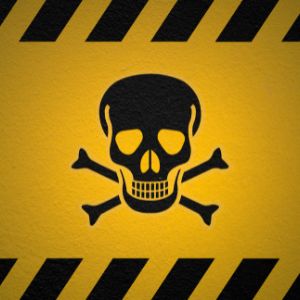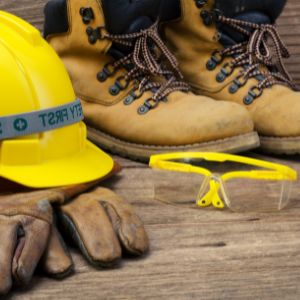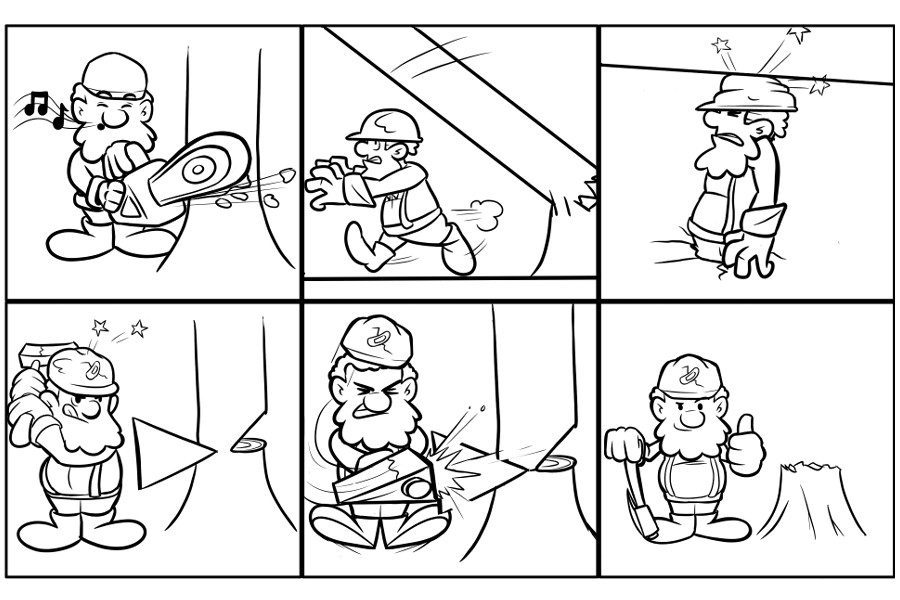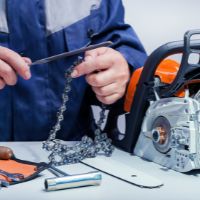Are Chainsaws Dangerous to Use?
 Or put another way, are chainsaws safe to use?
Or put another way, are chainsaws safe to use?
Since chainsaws of all sizes and descriptions are inanimate objects, the answer depends entirely on how they are used by the person operating them!
Of course chainsaws are, by their very design, more inclined to be dangerous to the user than say a hose pipe! 🙂
But there are many ways to make chainsaws safe to use for both the operator and those working along side or close by.
These include:
- common sense (the most important ingredient!)
- adhering to best practice rules for chainsaw use
- wearing appropriate safety gear
- Using other equipment to help out when required e.g. Tree felling wedges
- keeping the chainsaw serviced and fit for use e.g. chain correctly tensioned
- being aware of the inbuilt safety features of your chainsaw and not overriding or modifying them.
So lets take a look at these one by one.
Common Sense

Unfortunately very true!
This quote by Voltaire summarizes many quotes down the years that have pointed out that, unfortunately, common sense is not that common when it comes to the actions of humans!
Chainsaws are designed to cut through things quickly and efficiently and do the job pretty well. Unfortunately, the chain wont distinguish between a branch or an arm or leg or a finger!
The reality then is this. In the absence of common sense, chainsaws can be very dangerous to use. Painful injuries and even fatalities are not uncommon outcomes of chainsaw accidents.
But a little common sense can ensure that chainsaws are indeed safe to use!
And in fact, all the points that follow could well be filed under the “common sense” heading.
Adhering to Best Practices for Chainsaws
The University of Missouri (amongst many others) have developed a list of best practices for using a chainsaw. You can see the article HERE.
Even though these are decades old, they are worth a read. In fact, they are worth printing out, framing in a luminous pink and lime green frame and sticking it on the wall above where you keep your chainsaw(s)!!
That’s because another famous quote (by Geoffrey Chaucer in the 1300s) goes like this:
“Familiarity breeds contempt”
In other words, with reference to your chainsaw and safety, the more you use it without incident, the more you are likely to take shortcuts and chances. Hopefully that brightly framed list will remind you often enough NOT to take shortcuts or chances!
Wearing Appropriate Safety Gear

Don’t skimp on safety gear!
When considering what safety gear to buy, and how much to spend on it, consider this question.
How much is your arm/leg/toe/eye/finger/life worth to you?
Then shop accordingly!
Yes there is always a monetary limit to what you can afford but apply a little common sense here and don’t scrimp on the important stuff.
To some degree this will depend on size chainsaw what you are using.
Mini chainsaws will require less safety gear as something like chainsaw safety chaps are probably not required. However, eye protection in the form of safety glasses or a safety helmet and visor would be advisable.
Here is a brief list of areas of your body that can be vulnerable when using a chainsaw together with what you should consider using that will make using a chainsaw much safer!
- Eyes. Flying bits of wood and sawdust can seriously damage your eyes. Protective safety glasses or a safety helmet with visor can protect your eyes.
- Legs. Legs are particularly vulnerable when using big powerful chainsaws. Chainsaw Chaps are designed to prevent or at least limit the damage should a whirring chainsaw chain accidentally come into contact with a leg (or two)!
- Fingers & Hands. Cut resistant chainsaw gloves will offer some protection. They will probably hinder you if you are trying to use a mini chainsaw so might actually be counterproductive if you only use a mini chainsaw.
- Ears. While electric chainsaws are far quieter than gas powered chainsaws, most chainsaws make enough of a noise to damage your ears if you don’t protect them.So a pair of safety ear muffs are in order, especially if you are using a gas powered chainsaw.
That probably covers the most important bits of safety gear that you should consider equipping yourself with.
Other Equipment
There are a multitude of situations in which you might find yourself using a chainsaw and so its not possible to give you a comprehensive list.
But hopefully these few examples will give you an idea of what to look for or think about.
Tree Felling Wedges
 A tree, especially a big tree, can do a lot of damage to people and property if it falls in the wrong direction
A tree, especially a big tree, can do a lot of damage to people and property if it falls in the wrong direction
These little bits of plastic can make all the difference in ensuring that a tree falls in the correct direction.
When used correctly they will make life both easier and much safer for both the chainsaw user and anyone standing in the vicinity.
Often used in conjunction with
Tree Felling Ropes
The name says it all – ropes and wedges all assist the chainsaw user to make sure the tree falls in the right direction – and nowhere else!

NB Chainsaw safety is far more than just dealing with the chainsaw!!
Regular Servicing
 Servicing a chainsaw regularly is one of the best ways to ensure that a chainsaw is safe to use.
Servicing a chainsaw regularly is one of the best ways to ensure that a chainsaw is safe to use.
A chainsaw functioning optimally is a far safer tool than one which is neglected, has worn or loose parts and a blunt chain.
If its a gas driven chainsaw, you have 2 parts to service:
- The motor & body – oil, spark plugs, air filter,
- The chain – chain sharpening, correct chain tension etc
If its an electrical chainsaw then the motor is probably sealed, but you should still check things like the oil flow if its self lubricating.
Inbuilt Safety Features
All chainsaws, from 4-inch bar mini chainsaws to the big gas powered chainsaws, feature a range of safety features designed specifically to make using the chainsaw safe(er).
Make sure you know what these features are and how they work and NEVER try to bypass or remove them (sometimes easily done on a mini chainsaw).
Chainsaw Safety 101
Take a look at this video on chainsaw safety.
The bottom line is that chainsaws are dangerous to use if you don’t obey the basic rules.
But if you obey the rules, you can enjoy many safe hours of using an incredibly useful tool!
You can also read these posts:
